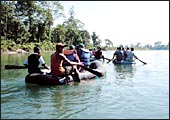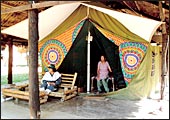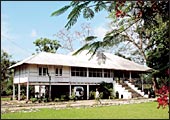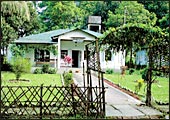|
Snow-capped
peaks, flaming red rhododendrons, sparkling white magnolias, exotic
forests, fern-filled valleys and emerald green tea bushes-Darjeeling
holds many an attraction for tourists. Now, there's an addition
to the list: the chance to stay on a tea garden and savour the
fabled lifestyle of planters. Says Rajah Banerjee, the fourth
generation scion of the family that runs the world's oldest single-owner
tea estate, Makaibari Tea Estate, which also doubles up as a tea
garden resort: "You can always stay comfortably in a star
hotel, but you will never get to see and hear diverse flora and
fauna, the chirping birds, rumblings of a distant waterfall and
a dense forest from your room."
BEST TIME TO VISIT: September-May
TARIFFS: Rs 2,000-7,500 per night per couple (varies from
garden to garden)
NEAREST AIRPORT: Bagdogra
NEAREST RAILHEAD: New Jalpaiguri
CLOTHING: Check with garden manager |
The Glenburn Tea Estate is located in a river
valley and offers breathtaking views of the Kanchenjunga. It stretches
from an elevation of 3,700 feet, all the way down to the banks
of two snow-fed Himalayan rivers, Rungeet and Rung Dung. On offer
is a "Barbeque Weekend" at the colonial Glenburn Bungalow
and an action-packed "Camp Out", which includes river
rafting on the Rungeet and a hike through the adjoining forests
that are a bird watcher's and hiker's paradise. Gardens like Phaskowa
Tea Estate and Goomti Tea Estate have also jumped on to the tea
tourism bandwagon. Kanwar Deep Singh, who owns the Dooteriah Tea
Estate, admits that tourism offers Darjeeling's gardens, many
of which are on the brink of financial collapse, a critical lifeline.
"Tea planters have traditionally led luxurious lives. It's
part of the industry's cultural heritage. Tea garden tourism simply
packages this into a marketable form and offers people a chance
to see and enjoy the lifestyles of colonial country gentlemen,"
says Raj Basu, CEO, Help Tourism, an NGO that promotes heritage
Tea Tourism in Darjeeling and the Dooars, and even organises individual
tours.
|

|
|
The adventure
begins: River rafting (topt),
and camping out (below) are standard features in most packages
|
|

|
"It's a truly royal experience. You get
the comforts of a top-end hotel amid lush green nature and wish
you'd left your wristwatch back home," says Manishi Mukherjee,
Country Head of us software firm Varian India, who recently stayed
at one of these tea gardens. Tariffs range from Rs 2,000 for a
double room at Makaibari to Rs 7,500 at top-end garden-resorts
like Glenburn Tea Estate. Meals are served in sprawling British-era
dining rooms by masalchis and drinks by abdars, but room service
is also available. On the menu: Continental, Indian and Chinese
cuisine, and some exotic local and Tibetan delicacies.
The authorities, for once, have latched on
to a good thing. The West Bengal government and the Darjeeling
Gorkha Hill Council (DGHC) are aggressively promoting tea tourism.
They are encouraging garden owners to renovate and let out unused
bungalows to tourists seeking seclusion in the company of nature.
"Tea tourism has enormous potential and we are working to
bridge tourism with conservation for the sustainable development
of the local community," says Basu.
|







